Feature
Leonard Rossiter: a conviction in comedy
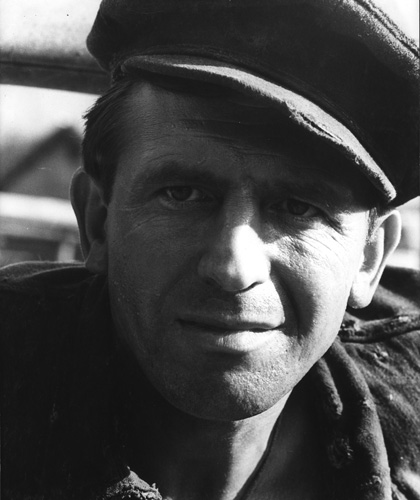
Leonard Rossiter in King Rat
As Tripper’s Day, Leonard Rossiter’s final comedy, is released on DVD, Gary Mills remembers the competitive, uncompromising star who was Reggie, Rigsby, flatulist and farceur
Pop culture history is peppered with the most uncannily accidental discoveries of talent. The extraordinary vocal talents of ex-Cocteau Twins singer Liz Fraser were only stumbled upon once she’d caught the attention of her future bandmates with her dancing. And one of the 20th century’s pre-eminent American illustrators, Bernard Fuchs, took to the easel merely as a diversion from the pain of his inability to pursue his first love of playing the trumpet, a deputy career path unhindered by the momentous accident that robbed him of three fingers on his drawing hand.
Similarly driven and initially unheralded were the abilities of Leonard Rossiter, one of the finest and most versatile stage and screen performers of his generation. Rossiter only embarked upon the actor’s life at the age of 27, raw and untrained, having accompanied an amateur thespian girlfriend to her rehearsal and surmised that he could do better. The next 30 years proved conclusively in his favour; his memorably vigorous career was ended abruptly in 1984 by a fatal heart attack. At the time of his death, some years after his heyday, he was perhaps best known to the viewing public for his pratfalling Cinzano adverts, while Thames Television were midway through a debut run of the largely forgotten Tripper’s Day.
What both this misfiring series and those ads seemed to so obdurately confirm is the common image of Rossiter as a manic, goofy, sitcom drone, a cheesy – and by this time, slightly self-parodic – mains-wired jester, specialising in wicked comeuppance routines or a similar unbeknownst humiliation at the expense of others. Yet muddied by both this overstatement and his early death was a richly diverse and arguably peerless life in theatre, film and television. As Tripper’s Day sees its debut commercial release on DVD and the first major biography of the man is published (Character Driven: The Untold Story of a Comic Genius by Guy Adams), it’s worth reacquainting ourselves with this most vivid of careers.
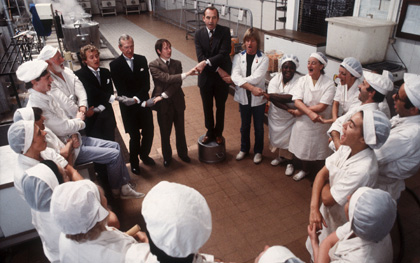
Britannia Hospital
Having precariously ditched a safe clerical day job at Commercial Union Insurance, the Liverpool-born Rossiter earned his stripes in regional repertory theatre with a two-year stint at the Bristol Old Vic. It was a fitting vocation, a lifelong calling (literally – he died in his dressing room between acts of Joe Orton’s Loot) and a home for his furious energy of performance and talent for farce. The demands of the stage offered a perfect proving ground for him to hone his famed knack for learning lines at light speed and singular command of the audience. In time, he would be lauded for his portrayal of characters in plays by Molière, Pinter and Shakespeare, but two particular performances served to plot Rossiter’s future deployments on screen.
In David Turner’s Semi-Detached (1962-63), Rossiter appeared to define a certain bourgeois suburban archetype as Fred Midway, a basic self-perfecting everyman on the surface whose zeal to rise above his station paints a steadily repellent, crooked picture of the emerging middle class. This 1962 satire on the nouveau riche (at one point Midway expresses a proud wish to eventually become “completely detached”) revealed Rossiter’s gift for playing the aspiring trickster, the sniggering, deluded would-be profiteer who the audience knows will never succeed, in a role that would inform the sitcom characters yet to cast their marque. The “leering grin of a Halloween pumpkin” (as Martin Gottfried described it in Women’s Wear Daily) would stay just the right side of madness as Midway, but Rossiter’s next big part wasn’t forged quite so harmlessly.
As the eponymous lead in The Resistible Rise Of Arturo Ui (1967-69), Bertolt Brecht’s allegorical redrawing of Hitler as Al Capone, Rossiter achieved a major breakthrough. Such a grotesque, maniacal figure required the high-tension, acutely neurotic depth that only he could bring to the role, with a finely attuned gift for both slapstick and menace a specialist demand. According to Robert Tanitch’s 1985 tribute, Rossiter’s performance broke the mould on the production’s transfer to the Saville Theatre, at a time when “Brecht was considered poison in the West End.” Notices described him variously as “volcanic”, “like a nervous puff adder ready to strike” and “a ranting, psychopathic monster”, while multiple awards poured in.
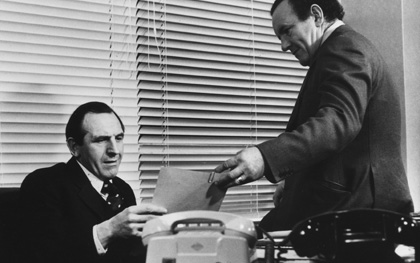
The Pink Panther Strikes Again
Making the leap from stage star to movie icon may have proved an elementary step for a charismatic contemporary like Richard Burton, but Rossiter somehow always seemed predestined to be a bit-part character man on film. Yet while Semi-Detached bombed on Broadway and needed Laurence Olivier’s box-office draw to get to London, Rossiter prevailed to forge celluloid relationships with some of the most distinguished directors of the day.
In a film career bookended by parts in Lindsay Anderson’s films This Sporting Life (1963) and Britannia Hospital (1982) – the latter an apt platform for one of many judiciously pitched displays as a harassed mid-ranking authority figure – Rossiter proved himself a deft supporting player. With the aid of a brilliantly malleable physicality – central to which was his beaked, gangling frame (defined memorably by friend James Grout as “a face like a delinquent lizard, a voice like a corncrake and a body like a broken penknife”) – he established his demand in Carol Reed’s Oliver! (1968), a clutch of Bryan Forbes pictures – including the star-studded transatlantic POW thriller King Rat (1965) – and as the hapless Superintendent Quinlan in the fifth instalment of Blake Edwards’s Pink Panther series, The Pink Panther Strikes Again (1976).
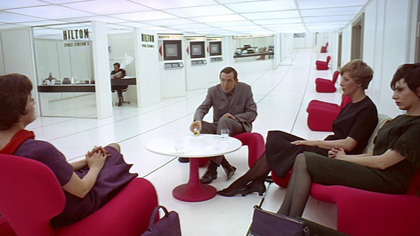
2001: A Space Odyssey
Perhaps the most fitting big-screen association, however, was that formed with Stanley Kubrick, with whom Rossiter shared an obsessive perfectionism and unwavering insistence on standards. His contribution in a brief role as the inquiring Russian scientist André Smyslov in 2001: A Space Odyssey (1968) earned him a part in 1975’s Barry Lyndon, this time playing the craven Captain Quin, a haughty fool whose affluent means somehow defeat Ryan O’Neal’s Barry in a comically staged duel for the affections of a mutual love.
Indeed, it was as a comic actor that Rossiter ultimately became a household name thanks to a range of performances, though one or two of his very best are generally overlooked. As the redoubtable flatulist Joseph Pujol in Galton & Simpson’s rarely shown 1979 short film Le Petomane (a role both Niven and Sellers were advised against accepting), he is measured and brilliant in a riotous display that could so easily have inspired the kind of overacting that he was occasionally erroneously criticised for. Again, the part arose as a result of a successful prior collaboration, in this case a convulsive turn in an edition of Yorkshire Television’s Galton & Simpson Playhouse two years previously. Portraying an insistent idiot prepared to go to alarming lengths to prove he’s right in I Tell You It’s Burt Reynolds, Rossiter is braying and uncontrolled yet still superb.
This was of course the medium with which Rossiter shared the most lasting attachment, and by the mid-1970s his considerable repertoire ran to appearances in staple shows such as Z Cars and Steptoe & Son, and even some prescient sci-fi drama under the watchful, visionary eye of Nigel Kneale in The Year of the Sex Olympics from 1968. But it was at YTV he found his home.
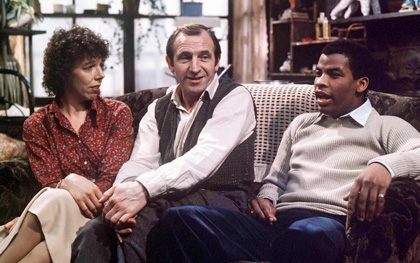
Rising Damp
Over four series (1974-78) and a movie adaptation (1980) as Rising Damp’s oily, obsequious landlord Rupert Rigsby, Rossiter became one of the biggest UK television stars of the day, indulging an acute skill for slapstick and double takes and cultivating a growing reputation as one of the premier farceurs in the field. Having successfully made the shift from the stage (where Eric Chappell’s play was originally entitled The Banana Box), Rising Damp was a grimy, hemmed-in set piece that revolved almost entirely around Rossiter’s neurotic ignoramus. If, however, Rising Damp saw a performance that routinely teetered on the brink of being mugged and overly mannered, his finest hour was altogether more profound.
It’s hard to recall a more nuanced, complex comedy drama than David Nobbs’s The Fall and Rise of Reginald Perrin (1976-1979). This was a sitcom whose situation consistently changed shape, where common environments varied on a regular basis and the dependence on Rossiter’s full gamut of performing traits increased accordingly. As Reggie – a markedly more appealing character than either Midway or Rigsby, drawing empathy where they deserved pity – he is by turns maddened and driven to eccentricity by the vacuum of executive monotony, then veering towards devastation at how his behaviour affects those around him. Rossiter is a delight, hopeless and crestfallen by circumstances that always seem to drag him back to the office, yet heavy with pathos through those furtive attempts at escape: the disguises, daydreams and schemes for happiness and release. He is also as tightly wound as ever, literally pouring with sweat during long scenes shot in front of a live studio audience as he pushes Perrin’s breakdown to the electrically charged verge of insanity.
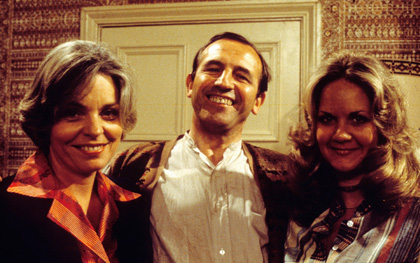
The Fall and Rise of Reginald Perrin
This renowned tension never manifested itself as negatively for Rossiter as it did for Reggie – he never contemplated such a reckless withdrawal from society: “It would be a bit difficult in a career in which you’re lucky to get one week’s work in 15,” he said in 1978. Nor did it eventually claim his life, an undetected congenital heart defect being ultimately responsible. It was however a source of a raging competitiveness that kept him in otherwise tremendous physical condition while fuelling an acute, occasionally infuriating fastidiousness at work.
As a determined enthusiast, Rossiter was compelled to shine in several sports, including cricket (excelling almost to professional standard as a schoolboy), tennis, and football, at which he regularly turned out for charity games. But his biggest passion would emerge in a thrice-daily squash habit, leading to participation in the 1984 British Amateur Championship. At 50, he claimed he could “still give most men ten yards start in a 100-yard sprint… I suppose fitness is important… living at my pace.”
Rossiter would also apply this sense of purpose to acting, demanding the same work ethic from colleagues and famously losing his temper with those he deemed to be coasting. To some, he has suffered the standing of an actor who was difficult to work with, perhaps understandably so: he described Joan Collins, foil to his music-hall buffoonery that made the Cinzano campaign such a success, as “the prop”. Yet in identifying this direct, unconditional approach, the testimony of Reggie Perrin co-star Geoffrey Palmer is more typical: “What he was concerned with was ‘getting it right’… Len, for the sake of the show, would, if necessary, tell other people how to do their job or even do it for them. In three series of Reggie Perrin he was never wrong.”
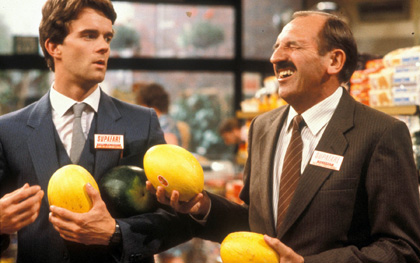
Tripper’s Day
Sadly, the fact that Tripper’s Day has lain dormant for more than 25 years seems to underline the waning of Rossiter’s judgement. As Norman Tripper, manager of the fictional Superfare store, he is doomed to slog through the very cheapest of productions, with far too much emphasis placed on the large supporting cast and nowhere near enough quality material to make it work. Aside from having to deliver some truly painful race and sex gags (which would surely have felt archaic and embarrassing even on first transmission), Rossiter’s own performance isn’t bad, though the dwelling on Tripper’s image as a fussy, luckless boss grates very quickly. Not even the contribution of theme-music legend Paddy Kingsland can lift proceedings, his puerile synthetics illustrating Tripper’s former life as a military policeman in a nonsense coin-op videogame march.
Such a clichéd final act was hardly what Rossiter deserved. His sheer energy alone ensured the kind of abundant output that most actors would only aspire to, on stage, screen or film. A unique, frequently achieved drive to succeed should have set him apart to a greater extent than maybe it did, though in truth his comedy successes give the lie to any notion that he spread himself too thinly.
But perhaps there is some benefit in remembering a handful of vermouth commercials and a bad supermarket-based sitcom when we come to consider this legacy, for, as Wilde had it: “The cynic knows the price of everything and the value of nothing.” If anyone’s personal epilogue has been mirrored with such posthumous under-appreciation, then it is that of Leonard Rossiter. We might have learnt to cherish this calibre of talent if only we’d had the chance to witness it again.
‘Tripper’s Day’ is available now on DVD from Revelation Films
See also
Troy Kennedy Martin, 1932-2009: Lez Cooke remembers the screenwriter of Z Cars (January 2010)
From romance to ritual: Kim Newman on Kubrick’s Barry Lyndon (March 2009)
Send in the clowns: Rob White revisits Alec Guinness’ first major TV role as the fastidious cuckold and master agent in Tinker, Tailor, Soldier, Spy (October 2000)
Blues in the night: David Jays revisits Dennis Potter's haunted song album of a series, Pennies from Heaven (September 2000)
